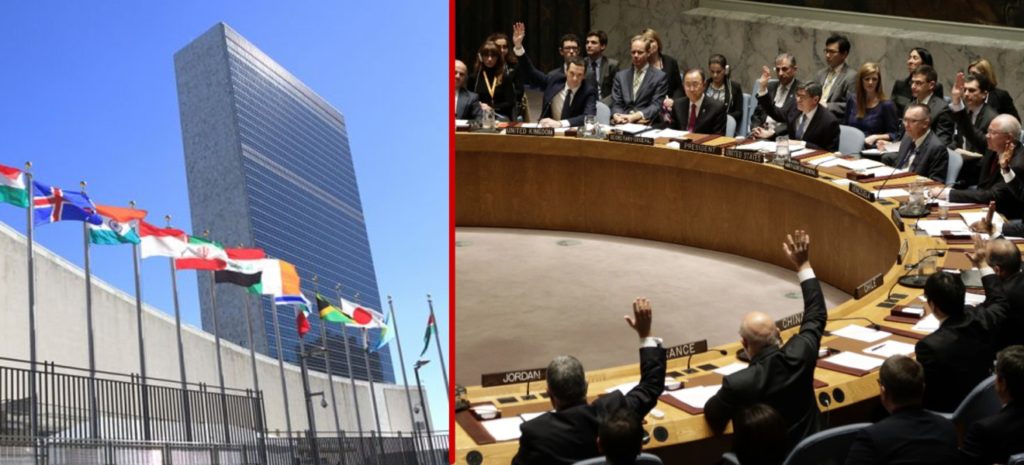by Celine Nahory
[Editor’s Note: During the Cold War, the UNSC seemed to be neutered by the fact that both superpowers held a veto. Celine Nahory argues that even after 1989 the power of the P5, the Permanent Five (US, UK, France, Russia, China) still rules the roost by other means. Although there are ten other members with 2-year terms on the UNSC, sometimes including Australia, these cannot overcome the powerful. Celine Nahory wrote this article in 2004 for Global Policy Forum under the title “The Hidden Veto.”]
The Hidden Veto
The veto has always loomed over the work of the UN Security Council. During the Cold War, the United States and the Soviet Union often brandished their prerogative publicly in Council meetings. Overall, the five permanent members cast 199 vetoes between 1946 and 1989 – well over four per year – preventing the Council from taking action on many important matters.
Since the end of the Cold War, however, the formal use of the veto has diminished dramatically. [But] … the P5 continue to pressure the Security Council through a “hidden” veto – the quiet threat of possible veto use. As Ambassador Curtis Ward of Jamaica put it, “the mere presence of the threat of the veto determines the way the Council conducts its business.”
Permanent members use the hidden veto mainly in closed-door informal consultations, rather than in official open meetings. Since the late 1980s, the Council largely conducts its business in such private sessions. Away from the public… the P5 have more freedom to pressure, threaten, and even bully other members of the Council. …
Washington’s constant threat of vetoes on Security Council actions critical of Israel is a notorious example of this abuse, which generally worsens international crises. Though the Arab group has obtained monthly Security Council meetings on the situation in Israel and the Occupied Territories, the US prevents any substantive role of the Council on the matter….
By contrast, France’s threat to block a resolution authorizing war against Iraq in the spring of 2003 illustrates the very unusual case of a threatened veto with an arguably positive effect. Contrary to most threats of veto, France made its threat publicly, confident that worldwide support for its action would ultimately help other members of the Council to stand up against US pressure
But in the great majority of cases, a single member issues a veto threat against the will of a large majority of Council members, and often too against the preponderance of UN member states and international public opinion.
Controlling the Agenda
Permanent members use their hidden veto to control the Council’s agenda and prevent the Council from taking up certain issues. The Council never discusses crises that a P5 member considers to be within its own exclusive sphere of interest. Chechnya, Tibet, Xinjiang, Northern Ireland, Sudan, Uganda and Colombia figure among the forgotten conflicts that the Council ignores.
in earlier days… hidden vetoes kept key issues such as colonial wars and Cold War conflicts off the agenda. The Security Council never debated the Algerian war or the partitioning of India because of the hidden vetoes of France and the UK.
Nor did the Council take up US involvement in Vietnam or the Soviet war in Afghanistan even though hostilities continued for almost a decade after Moscow vetoed a draft resolution in 1980.
To prevent the Council from discussing taboo issues, permanent members carefully mould the monthly program of work during intense negotiations among the rotating president and the other Council members.
Though the UN Charter does not provide a right of veto on procedural matters, the P5 insist on their right to set the boundaries of what may and may not be said. The P5 argue implausibly … that the Council makes a decision on substance (rather than a simple procedural move) when deciding what goes onto the agenda, thus making such a decision subject to a veto!
Blocking Action
… Iraq, a theater of deeply divergent strategic and commercial interests among the P5, has provoked more threats of veto than any other recent issues…. the US and UK clashed with Russia, China, and France – freely using their hidden vetoes at every turn, not only in the Security Council, but also in the Council’s sanctions committee dealing with Iraq.
During committee debates, the US (and sometimes also the UK) blocked approval of contracts for Iraq imports under the Oil-for-Food programme, while in the Council, France and Russia blocked lesser changes of the sanctions regime….Threats of veto blocked action on … no-fly zones, arms inspections and eventually the war of 2003.
The hidden veto weakens many resolutions by removing language disapproved by P5 members. France presented a draft resolution in January 2004 on the protection of children in armed conflict. The text was based on a 2003 report by the Secretary General that provided a list of affected countries. The UK and Russia strenuously opposed the inclusion of Northern Ireland and Chechnya as “armed conflicts,” especially because the conflicts would be subject to monitoring under the terms of the resolution.
… In the Security Council’s culture of formal cooperation and teamwork, the hidden veto plays a highly strategic role even among the P5 group. As the Council increasingly takes decision by consensus, permanent members consult often among themselves on important matters before going to the Council with a common arrangement. The United States and Russia apparently struck a deal in 1999, trading off a threat of Russian veto on Iraq in return for ”no action” on Chechnya.
Early in their term, elected members learn the topics they cannot raise without risking a very high price. Increasingly discouraged after facing one hidden veto after another, they stay away from these topics, creating what can be considered a “double hidden veto.” In addition to P5 threat of veto, then, elected members’ self-censorship paralyzes the work of the Council. When determined ambassadors challenge the veto system, they are quickly put in their place.
Past the middle of his term in the Security Council in 1999-2000, Ambassador Peter Van Walsum of the Netherlands interjected a statement about Chechnya in a Council debate on another subject. Ambassador Sergey Lavrov of Russia immediately interrupted to object and make clear that, as a veto-wielder, he would block any further discussions on the topic.
Hidden vetoes can have terrible consequences. The Security Council failed to act during the Rwandan genocide in 1994 due to the hidden vetoes of France and the US. Paris and Washington not only blocked UN action, but also used their hidden veto to weaken the definition of the crisis under international law.
An independent UN report admitted that the failure of the Security Council to act led directly to the genocide. The Security Council could not even pass a resolution containing the word “genocide,” which would have required intervention by parties to the 1951 Genocide Convention.
Only after the worst months of the killing did the Security Council endorse Opération Turquoise, a deployment of French troops as a “humanitarian” mission under the UN flag. Yet, 800,000 people died because permanent members considered an earlier UN intervention contrary to their interests.
A Human Rights Watch report scathingly said: “The Americans were interested in saving money, the Belgians were interested in saving face, and the French were interested in saving their ally, the genocidal government.”
… Only abolishing the power of veto can resolve the problem of the hidden veto. But permanent members oppose any reforms of the voting system. Eager to keep their absolute prerogative, the P5 will rule out any attempts to eliminate the veto – even proposals aiming at limiting the use and the scope of the veto.
Permanent members concede that the veto should remain a “last resort,” but in fact they use the hidden veto constantly. Their abusive use of this privilege bedevils the Security Council, making it undemocratic, lacking in legitimacy and often sadly ineffective. [All bolding added by Gumshoe]
— Celine Nahory lives in Mumbai. She has many years of experience working with NGOs in the US, Japan and India, carrying out research and running advocacy campaigns on issues of peace, security, disarmament, human rights and sustainable development.































This article is brilliant. And I wonder how many other areas the concept of ‘hidden veto” could be applied to.
The ability to veto makes the United Nations Organisation an irrelevant body, using up huge World financial resources which could be used to better the life of millions of people. A group of worthless bulgers have a career with large incomes, doing nothing but debating a lot of nonsense.
A non elected World Government where the participants fear no insecurity of being voted out of a lavish life style.
I have personally have a letter from the UN Human Rights Commissioner, admitting that this organisation has no power, but their job is to only record any atrocity that is report.
Sorry for the bad composition of above paragraph.
No worries, Mate, you’ve only made 3 typos in 5 years. Now look at this bit:
“An independent UN report admitted that the failure of the Security Council to act led directly to the genocide. [LED DIRECTLY TO THE GENOCIDE, in Rwanda] The Security Council could not even pass a resolution containing the word “genocide,” which would have required intervention by parties to the 1951 Genocide Convention.”
Funny how they needed to kowtow to a law when they forged right ahead on making up new stuff for purpose of “ordering” a no-fly zone in Libya a few years ago.
May I endorse the words of Aussiemal.
The UN was designed by the Rockefellers, has its HQ on Rockefeller land in New York, and has always been a tool for the investment bankers to rule the world.
The word ‘democracy’ cannot be applied to an organisation over which the people of the world have no control, whatsoever.
And the term “international community” is a euphemism for ruling elite; nothing more.